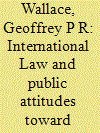|
|
|
Sort Order |
|
|
|
Items / Page
|
|
|
|
|
|
|
| Srl | Item |
| 1 |
ID:
117994


|
|
|
|
|
| Publication |
2013.
|
| Summary/Abstract |
Domestic approaches to compliance with international commitments often presume that international law has a distinct effect on the beliefs and preferences of national publics. Studies attempting to estimate the consequences of international law unfortunately face a wide range of empirical and methodological challenges. This article uses an experimental design embedded in two U.S. national surveys to offer direct systematic evidence of international law's effect on mass attitudes. To provide a relatively tough test for international law, the surveys examine public attitudes toward the use of torture, an issue in which national security concerns are often considered paramount. Contrary to the common contention of international law's inefficacy, I find that legal commitments have a discernible impact on public support for the use of torture. The effect of international law is also strongest in those contexts where pressures to resort to torture are at their highest. However, the effects of different dimensions in the level of international agreements' legalization are far from uniform. In contrast to the attention often devoted to binding rules, I find that the level of obligation seems to make little difference on public attitudes toward torture. Rather, the relative precision of the rules, along with the degree to which enforcement is delegated to third parties, plays a much greater role in shaping public preferences. Across both international law and legalization, an individual's political ideology also exerts a strong mediating effect, though in varying directions depending on the design of the agreement. The findings have implications for understanding the overall impact of international law on domestic actors, the importance of institutional design, and the role of political ideology on compliance with international agreements.
|
|
|
|
|
|
|
|
|
|
|
|
|
|
|
|
| 2 |
ID:
122900


|
|
|
|
|
| Publication |
2013.
|
| Summary/Abstract |
Past studies have applied insights from the democratic peace to show that democracies are also less likely to sanction one another compared to other regime types. More recent work challenges this finding by arguing that the economic peace between democracies largely disappears once methodological improvements are included along with the particular behavior of the United States as market hegemon. This article cautions that these critiques may themselves be an artifact of particularities in past data on economic sanctions. Using a larger and more representative sanctions dataset, the analysis shows that democracies do seem less likely on average to sanction each other. Furthermore, the United States does not appear to be unique in its sanctioning behavior compared to other democracies. However, the article proposes a middle ground between proponents and skeptics of an economic peace between democracies. The analysis shows that the pacifying effects of joint democracy only operate for security related sanctions, while in non-security related matters democratic constraints are less evident. The results point to the importance of considering more closely the choice of data on sanctions, but also the need to take into account the issues under contention for episodes of economic coercion.
|
|
|
|
|
|
|
|
|
|
|
|
|
|
|
|
| 3 |
ID:
115726


|
|
|
|
|
| Publication |
2012.
|
| Summary/Abstract |
The treatment of prisoners varies enormously across wars. Why are some prisoners horribly abused, while others are cared for humanely? The author argues key attributes of the belligerents, alongside the nature of the conflict itself, provides the most convincing explanation for differences in prisoner abuse. Democratic norms and domestic institutional incentives lead democracies to exhibit more restraint when dealing with prisoners. On the other hand, states caught up in drawn-out wars of attrition, or those seeking territorial conquest, are much more likely to resort to prisoner abuse. The author tests this argument against a variety of common alternative explanations using a new data set on prisoner abuse across all interstate wars from 1898 to 2003. The author finds strong support for the role of both the regime type and the nature of the conflict, while the results also suggest several points of difference from existing research on wartime conduct.
|
|
|
|
|
|
|
|
|
|
|
|
|
|
|
|
|
|
|
|
|